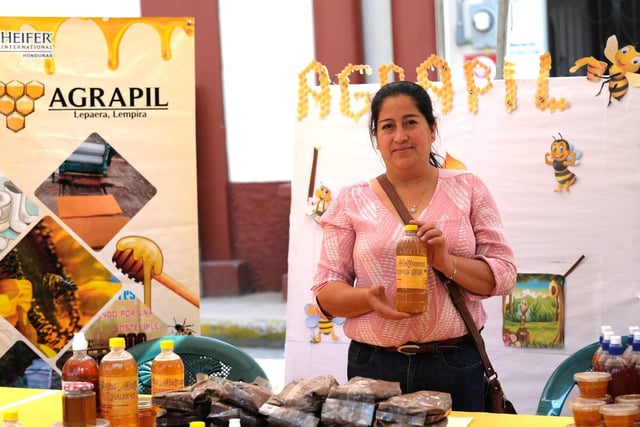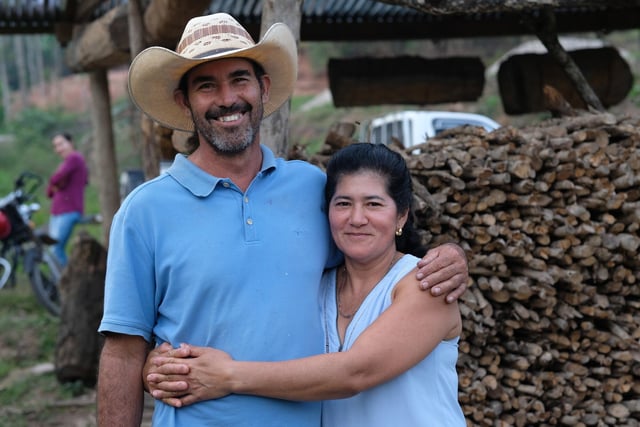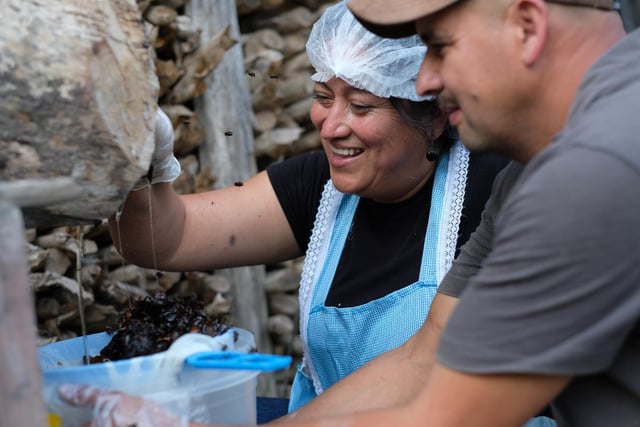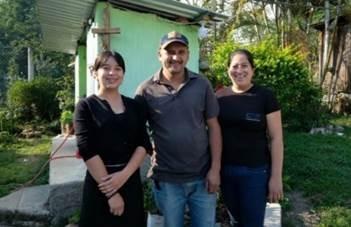Coffee farming has been the lifeblood of Juanita’s community but increasingly frequent and extreme weather has put their livelihoods at ever increasing risk.
In November 2020, Central America was struck by two major hurricanes, Eta and Iota, within two weeks that affected nearly 5 million people and triggered flooding and landslides that caused widespread damage.
“You can still see the impact of the landslides on the farm. Now, we are worried because the fertile layer of soil has been washed away,” Juanita explained.
Juanita’s community sits in the Central American ‘Dry Corridor’, an area of land that spans parts of Honduras, Guatemala, Nicaragua, and El Salvador, and is typified by extended periods of drought followed by periods of heavy rainfall; increasing the risk of poor harvest and food shortages.
This region is also badly impacted by El Niño – a climate phenomenon that occurs every five years on average and which usually causes a mix of extreme temperatures, drought, heavy rainfall and flooding, that devastates small-scale farming communities.
But thanks to funding from Christian Aid and from many supporters in Northern Ireland through their kind donations via the Presbyterian Church in Ireland and the Church of Ireland’s Bishop's appeal, Juanita’s family have been cushioned from the worst impacts due to support received from our local partner Christian Organisation for Integral Development of Honduras.
As part of a project to support over 100 rural farming families to adapt to climate change, our partner provided Juanita with training on bee breeding and management as well as money to kickstart a beekeeping business, helping her to reduce the family’s reliance on coffee farming and boost their income.
“Honey helps us get extra income. I want to increase the number of beehives I have to improve my income.” Juanita said.
“I produced 150 litres last year and made $1,875 dollars. When I trade the honey, it supports my household expenses and it’s why I want all women here to be part of this, so they can have what I have,” Juanita added.
A profession dominated by men in Honduras, Juanita became the first commercial woman beekeeper in her community and later a member of a beekeeping group supported by Christian Aid’s local partner to bring farmers together to provide them with equipment and technical and financial support to help them diversify into beekeeping and boost their incomes. The group has helped Juanita to brand and market the honey she makes.
For Juanita, the importance of beekeeping isn’t just about generating income, it’s also about empowering local women.
“If women have an entrepreneurial way of thinking or a project, we can contribute to the family budget. We can rely on ourselves and are able to make our own decisions,” Juanita said.
“Most women only work in the domestic sphere and don’t have opportunities for paid work outside the home. My sister-in-law is now a beekeeper and so is my neighbour. They were encouraged by my example,” she added.
Regrettably, as in many other parts of the world, domestic violence is prevalent in Juanita’s community. According to the Women’s Right’s Centre in Honduras, there were 386 violent deaths of women in Honduras in 2023, and tens of thousands of reports of domestic violence recorded in the same year.
“Women suffer in many ways; domestic, verbal, physical, psychological and sexual violence. Sometimes men won’t share the family assets with their wife; that’s another type of violence. I really worry about women stuck in those violent cycles,” Juanita said.
In addition to beekeeping, Juanita is also a passionate gender-based violence activist, and Christian Aid’s local partner provided her with training to lead and support a group of domestic abuse survivors in her community to help them access legal support and know their rights under the law when they experience such violence.
“When women are experiencing violence, I have the contacts and ways to link them to those who can help them make a formal complaint. I give them advice on how they can do this,” Juanita says.
“If we need to transport someone, I seek the guidance of the women’s office. They then find a way to take her to a safe house where she no longer suffers,” Juanita adds.
Juanita is also determined to use the skills she has to train the group in beekeeping and help them to become financially independent of their abusers.
Thanks to her training, Juanita was able to support a member of the group to file a police report and arrange for her and her children to go to a shelter after her husband burned down her home. The group also later supported her with the reconstruction of her home. This survivor is amongst the 20 women Juanita aims to provide beekeeping training to this year.
“I like to support women because I don’t like them to experience violence. Women deserve to be happy,” Juanita said.
To find out more about Christian Aid’s work in Honduras and how you can support, visit: caid.ie/Beekeeping

1. image012.jpg
Juanita pictured selling her honey at a local fair as part of the AGRAPIL group, supported by Christian Aid’s local partner OCDIH. Credit: Amy Sheppey/Christian Aid. Photo: freelance

2. image011 (3).jpg
Juanita’s sister-in-law Maria Cruz pictured with her husband Jose Wilman Marquez with beehives hanging in the background. Maria was influenced by Juanita to start beekeeping. Credit: Amy Sheppey/Christian Aid. Photo: freelance

3. image010 (3).jpg
Juanita with her husband Jose extracting honey from a hive on their farm. Credit: Amy Sheppey/Christian Aid. Photo: freelance

4. image002 (21).jpg
Juanita with her husband Jose Alonso and daughter Cruz Jasmin in their garden in rural western Honduras. Credit: Amy Sheppey/Christian Aid. Photo: freelance